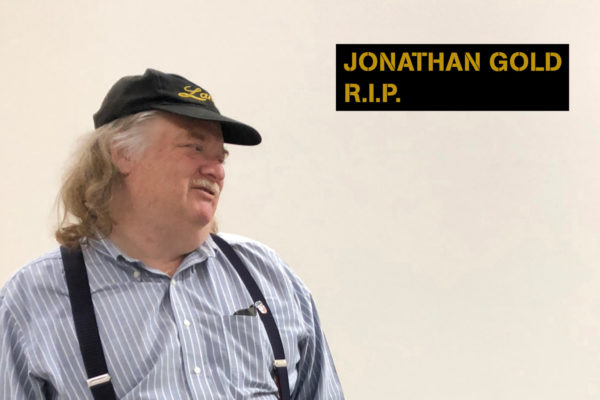When I learned of the news that Jonathan Gold had passed away, I was at a memorial for a dear friend—what a cruel irony. It came as a shock to me as I had interviewed Jonathan in late May for Artillery’s food issue. Gold’s name is emblazoned in black-and-gold letters on the cover of our current July/August issue.
Besides the weirdness of having an interview with someone that has since died, it was especially strange as Jonathan looked great when we met, full of mirth and generosity. He took time from his busy schedule to meet up with me twice, and in the short time that we were together, I was grateful for the attention he gave me and our interview. It was only later that he learned his awful diagnosis; his death followed swiftly.
I was able to spend those few days with him talking about art and food, and, for some of that time, the good old days. I have known Jonathan, and his wife Laurie Ochoa, for over 30 years—our connection was the LA Weekly, where we both worked for a time, and in particular my ex-boyfriend, Ron Stringer, who was especially close with the couple. We all hung out together, and Ron and I had often dined with them while Jonathan was reviewing restaurants. He and Laurie own several pieces of my art, and I shot the video for their wedding, which Jonathan recalled in an email exchange: “I still can’t watch it without simultaneously giggling and bursting into tears.” He then reminded me that it was 28 years, with an exclamation mark.
Jonathan’s reference to laughter and tears really captures his character for me. He was a walking paradox, shy in a way, but eager to share his thoughts and stories. He had no problem eating meat, but still cringed when he told of live fish cooked in boiling oil. He was very modest, but fully enjoyed his celebrity status.
One of the things that struck me most during our two-day reunion was when his wife called. You could tell it was a joy to him to find her name on his phone. I couldn’t help but eavesdrop, and most of the conversation seemed like simply checking in with each other—no real important reason for the call. He called her “sweetie” and it was apparent that he was still in love with his wife. Both times he rushed from our interview around 3 p.m. to pick up his son. He spoke with pride about his daughter’s ability to concoct a confection for a large party.
Jonathan was clearly a family man, and had a lot of love in him: love for food, love for Los Angeles and love for family and friends. When we published our piece, the goal was simply to share with you Jonathan’s feel for the city and the scattershot enthusiasm that he brought to every medium, from food to music to, yes, art. Fate has given this story another role—a last chance to bump around the city with one of its great scribes. We invite you to savor his last tour of the city’s ethnic core, and then to join us in expressing our condolences to his family, and to the city he did so much to define.


